14 Types of Lug Nuts to Secure Your Wheels Safely
Author: Omar Alonso | Editor: Omar Alonso
Review & Research: Jen Worst & Chris Miller
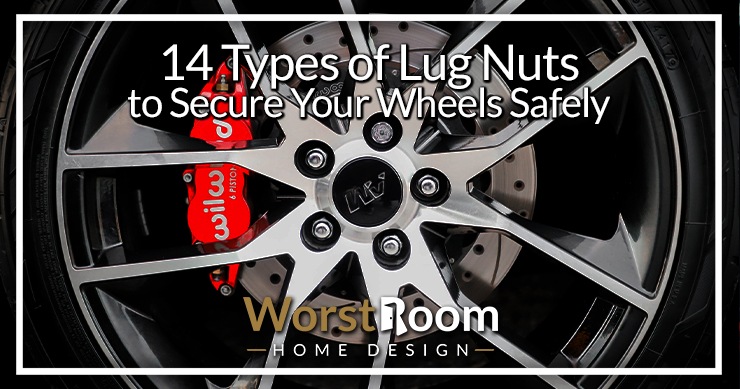
Lug nuts are the hardware that secures your vehicle's wheels. Suitable types of lug nuts guarantee the perfect installation of your wheels.
So, you can say these are small wheel fasteners with rounded or tapered ends that vary in shape depending on the kind you choose. There are many lug nuts like conical lug nuts, lug bolts, spherical lug nuts, etc. These types are usually made of chrome-plated steel or other robust materials.
Therefore, to provide you with all the necessary information, our experts have shortlisted all the essential facts regarding these lug nut types. So, keep reading till the end to know it all.
14 Types of Lug Nuts
Here, in this section, we’ll discuss all the important lug nut types because if you don't use the correct lug nuts, your vehicle may keep shaking, and these different lug nuts may loosen over time.
Some lug nut tidbits: Most lug nuts are chrome plated to resist corrosion. Some lug nuts are made to minimize the weight of a vehicle (like in a race car), in which case they'll be made from titanium or anodized aluminum. Most cars require 5 lug nuts per wheel, though some only use 4 and big rigs can have up to 8 or more.
Conical Lug Nuts
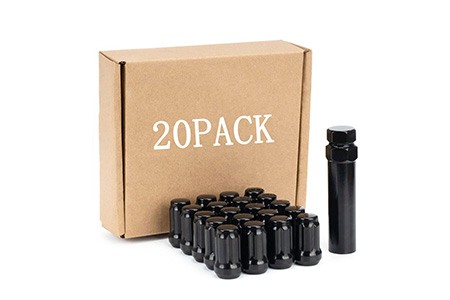
Conical lug nuts are perhaps the most common form of lug bolt you'll come across. They're found in a wide range of automobiles and are mainly cone-shaped. With these lug nuts, you can keep your wheels secured and tight.
However, it would be best to guarantee that your wheel studs do not protrude beyond the wheel by more than 40mm for these lug nuts to be a feasible option.
These kinds of lug nuts are pretty easy to operate if you have the right sizes with the right tools. You may also consider these lug nuts for your factory wheels, but in that case, you would need the exact size so that it fits fine with those.
Flat Seat Lug Nuts
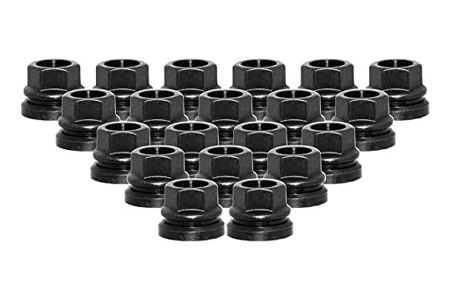
Flat seat lug nut styles differ a lot from other lug nuts because they feature a built-in washer and don’t have an expanded thread design. They're also convenient since the washer is included, although they're more difficult to torque than mag lug nuts, even with torque types of wrenches.
Moreover, these lug nuts usually come in a pack with 32 nuts, and you'll also need a 21mm wrench (hex) to put on these nuts on your wheel. So, always make sure to have all the essential tools with you before carrying on with the installation.
Mag Seat Lug Nuts
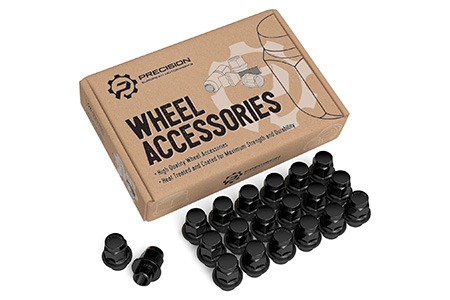
Mag seat lug bolts aren’t the same as any regular lug nuts. They have those flat washer seat that perfectly fits the wheel seats. Due to the long thread, it’s easier to install the nuts as you can apply greater torque. While using mag seat lug nuts, try to install them properly with the right tools.
Make sure you don't lose the washers or that when you purchase mag seat lug nuts that they do, in fact, come with the washers. That's the point of these types of lug nuts, and they're critical to the design of the wheel seat as well.
Extended Thread Lug Nuts
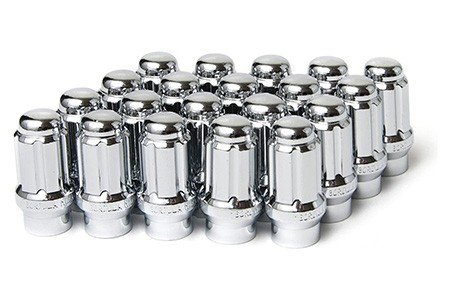
These lug nuts' wider thread provides good traction and makes the overall attachment easy. Thanks to the extended thread, they're simple to install and handle, which helps you easily tighten these nuts with your torque wrench without putting in too much effort.
The idea here is that they're longer, giving you more space to grip on to and work with, especially in tight areas. It helps with tightening because you get a better feel for the torque being applied and if any more is needed. This helps you from breaking them as well by not over-tightening.
These also are very visually noticeable. And since you can paint over chrome, these have become quite popular with people that like to customize and decorate their cars.
Spherical Lug Nuts
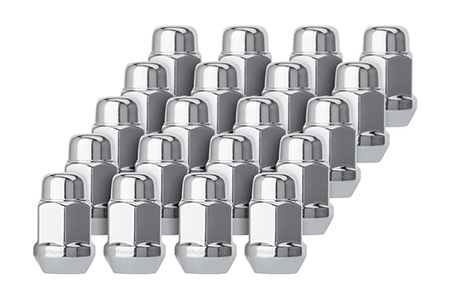
These lug nuts' spherical end or seat is an amazing feature that secures the wheels from getting displaced. Moreover, the upper half of these lug nuts is the same as the conical lug nuts’ head.
These rounded seat lug bolts are pretty handy and may be used on many cars and other vehicles.
Installing these lug nuts is pretty simple as you only need a 19mm wrench to tighten these nuts.
So, you don't need a wheel lock key, washer, or other tools tucked away in whatever types of garages you work out of to install these nuts. This is why these types of lug nuts are so simple and easy to operate.
Tuner Style Lug Bolts
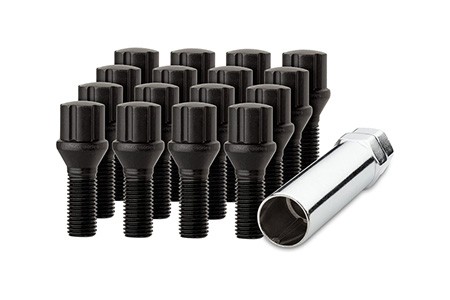
This particular lug nut has a perfect conical seat with a 60-degree taper, but the feature that separates these lug nuts from any other lug nuts is – it requires a unique tool to install and uninstall.
Furthermore, tuner nuts are often smaller than other different lug nuts, so it’s comparatively easy to maintain. You can keep your vehicle wheel perfectly functioning and secure with these nuts.
Lug Bolts
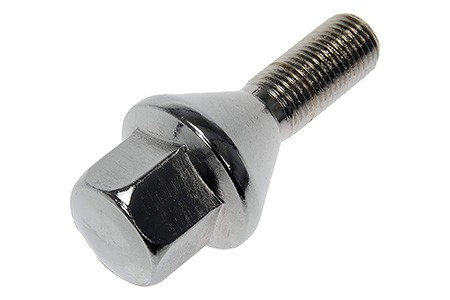
These types of bolts are for automobiles with a flat rotor with no studs. This isn't a common scenario, but there may be times when you need to work with cars or vehicles that don't have any studs in their wheels for attaching or securing items.
Although it's mainly available in Asian vehicles, you can still find these lug bolts in many classic European vehicles. Lug bolts are just different lug nut styles.
Spline Drive Lug Bolts
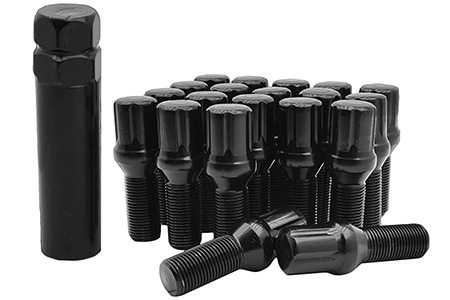
These lug bolts' thin and sleek design is perfect for your wheels with small lug holes. Moreover, they have a closed-end design that provides higher gripping strength, longer stud engagement, and a bigger sitting surface.
Also, the thin-walled adapter tool secures the wheel's surface while adding extra security from wheel thieves.
Hex Nut
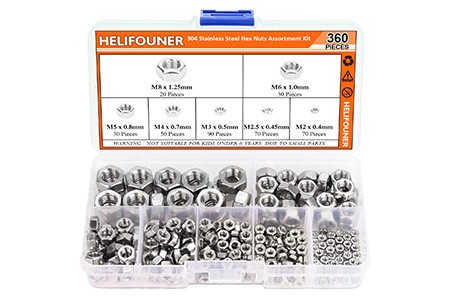
These different types of lug nuts are mostly used and found on bolts, anchors, studs, screws, and threaded rods. Moreover, hex is short for hexagon, and it refers to the fact that they have six sides.
Hex nuts also come in various stainless steel, nylon, and steel material types. You can easily identify this lug nut by the hexagonal sides. The design and sturdy features are what make these lug nut types unique from others.
Open-Ended Lug Nuts
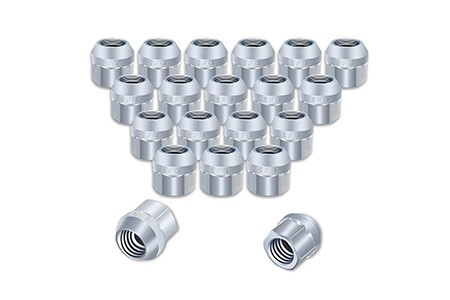
Open-ended lug nuts refer to a lug nut threaded to its full length but lacking a closed-end. This particular design allows you to place the lug nut on longer wheel studs without worrying about running out of thread on the studs, which may necessitate a wheel spacer.
That’s not all; more contact with the wheel stud is also possible due to the larger thread in these different kinds of lug nuts.
Flange Lug Nuts
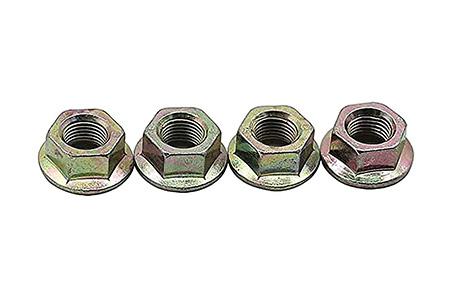
The flange-style lug nut has a little flange on the end to fit into a small recess on the wheel, which surrounds the stud hole. In many cases, the hole may not even have a recess. UTVs, Go-Karts, and other off-road vehicles commonly use this type of lug nut.
Double-Sided Lug Nuts
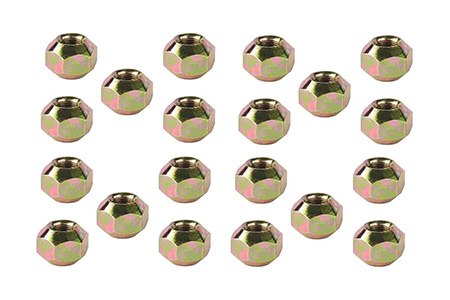
Double-sided lug nuts are generally famous for being used in racing vehicles where pit stops need to be lightning-fast to change the wheels. So, the lug nut may be installed in either direction, thanks to the double-sided design.
Therefore, there won’t be fumbling around during installation, and thus no possibility of the nut being fitted backward.
Left-Hand Threaded Lug Nuts
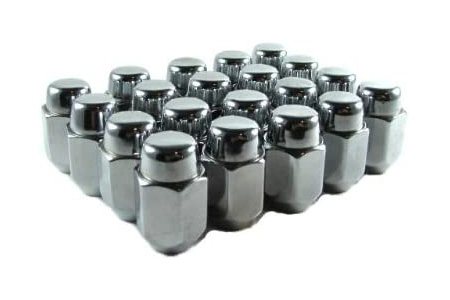
In the rare occasion you need different types of lug nuts that are threaded in the opposite direction. And it's equally rare to find them in a local auto or hardware store, so expect to order these if you need them.
You'll know you have the genuine article when the lug nut is stamped with the letter "L" or the letters "LHT" (meaning "left-hand threaded"). The reason you'd need these is if the bolts are inversely threaded. Sometimes this is the case because they tend to tighten themselves based on the rotation of the wheel.
Tuner Lug Nuts & Bolts
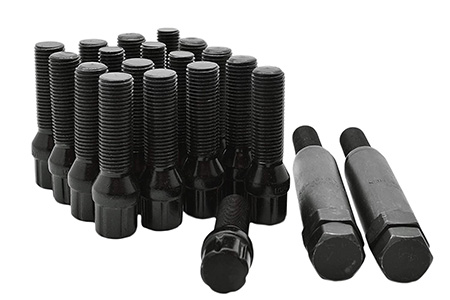
These bolts have a conical shape, and you'll need a specific key to remove these tuner-style lug nuts from your wheel studs. Tuner design lug nuts are typically offered with a 60-degree tapered form. You are most likely to find them on BRM and GT-5 wheels.
Lug Nut Styles
As a quick bit of added info, there are different styles of lug nuts that come in standardized sizes and designs. For example, you'll find 3 main types of lug nut seats. These are conical (sometimes called "acorn"), mag types (with flat washers), and spherical seat lug nuts (that have a ball shape seat to them). Sometimes you'll see flat seats where no washer is needed.
There's also standardized thread diameters, or thread sizes. These are based on the wheel studs' outer diameter (which matches the interior diameter of the lug nut). You'll find mainly 12mm x 1.25, 12mm x 1.5, and 14mm x 1.5. This is the diameter by the threads per millimeter. You'll also sometimes run into pitch, which is the distance between threads.
You won't need to worry about thread engagement or torque (go tight and then a little bit more). You don't want to have it too loose or it can wiggle its way off, and not too tight or you place too much pressure on the lug bolts and wheel studs.
Types of Lug Nuts to Fasten Anything Securely
The different kinds of lug nuts may appear small and insignificant. However, they have the potential to improve your driving experience and also give a safety guarantee to your vehicles.
Moreover, understanding these lug nuts can come in handy, especially during an emergency. So, we hope this article will now give you informative knowledge regarding the different types of lug nuts.



